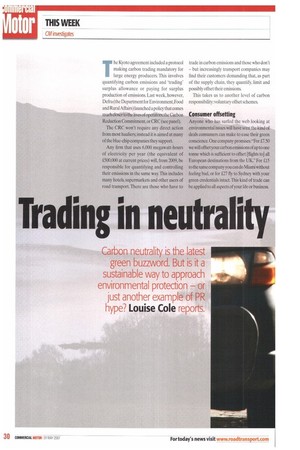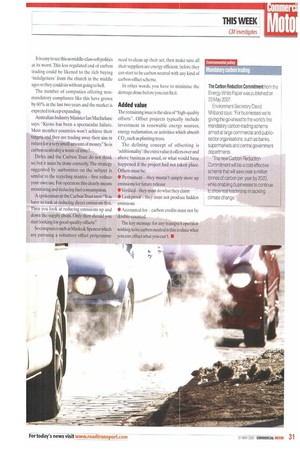Trading in neutrality
Page 30

Page 31

If you've noticed an error in this article please click here to report it so we can fix it.
Carbon neutrality is the latest green buzzword. But is it a
sustainable way to approach
environmental protection — or just another example of PR
hype? Louise Cole reports. The Kyoto agreement included a protocol making carbon trading mandatory for large energy producers. This involves quantifying carbon emissions and 'trading' surplus allowance or paying for surplus production of emissions. Last week, however, Defra (the Department for Environment,Food and Rural Affairs) launched a policythat comes much closerto the lives of operators:the Carbon Reduction Commitment, or CRC (see panel).
The CRC won't require any direct action from most hauliers; instead it is aimed at many of the blue-chip companies they support.
Any firm that uses 6.000 megawatt-hours of electricity per year (the equivalent of £500,000 at current prices) will, from 2009, be responsible for quantifying and controlling their emissions in the same way. This includes many hotels, supermarkets and other users of road transport. There are those who have to trade in carbon emissions and those who don't — but increasingly transport companies may find their customers demanding that, as part of the supply chain, they quantify, limit and possibly offset their emissions.
This takes us to another level of carbon responsibility: voluntary offset schemes.
Consumer offsetting Anyone who has surfed the web looking at environmental issues will have seen the kind of deals consumers can make to ease their green conscience. One company promises: "For £7.50 we will offset your carbon emissions of up to one tonne which is sufficient to offset [flights to] all European destinations from the UK." For £15 to the same company you can do Miami without feeling bad, or for £27 fly to Sydney with your green credentials intact. This kind of trade can be applied to all aspects of your life or business. his easy to see this as middle-class soft politics at its worst. This less regulated end of carbon trading could be likened to the rich buying 'indulgences' from the church in the middle ages so they could sin without going to hell.
The number of companies offering nonmandatory compliance like this have grown by 60% in the last two years and the market is expected to keep expanding.
Australian Industry Minister Ian Macfarlane says: "Kyoto has been a spectacular failure. Most member countries won't achieve their targets and they are trading away their sins in return for a very small amount of money." So is carbon neutrality a waste of time?
Defra and the Carbon Trust do not think so, but it must be done correctly. The strategy suggested by authorities on the subject is similar to the recycling mantra first reduce your own use. For operators this clearly means monitoring and reducing fuel consumption.
A spokesman at the CarbonTrust says:"You have to look at reducing direct emissions first. Then you look at reducing emissions up and down the supply chain. Only then should you start looking for good-quality offsets."
So companies such as Marks & Spencer which are pursuing a voluntary offset programme need to clean up their act, then make sure all their suppliers are energy efficient, before they can start to be carbon neutral with any kind of carbon-offset scheme.
In other words, you have to minimise the damage done before you can fix it.
Added value
The remaining issue is the idea of"h igh-quality offsets". Offset projects typically include investment in renewable energy sources, energy reclamation, or activities which absorb CO2, such as planting trees.
The defining concept of offsetting is `additionality': the extra value it offers over and above business as usual, or what would have happened if the project had not taken place. Offsets must be: • Permanent they mustn't simply store up emissions for future release • Verified they must do what they claim • Leakproof they must not produce hidden emissions • Accounted for carbon credits must not be double-counted The key message for any transpol operator wishing to be carbon neutral is this: reduce what you can; offset what you can't. •






















































































































































































